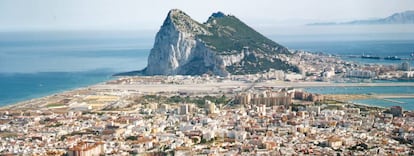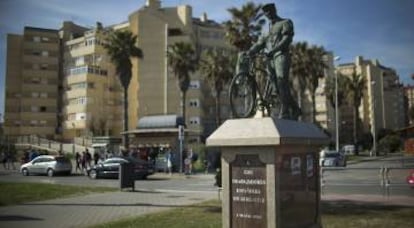Life around Gibraltar: one line, two very different worlds
Brexit is threatening the fragile economic symbiosis between La Línea de la Concepción and the Rock

“I don’t trust Madrid but I don’t trust London either,” says Michael Netto, International Relations manager for Gibraltar’s Unite union. “Is Spain prepared to penalize its own people by stirring hatred between Gibraltar and La Línea simply for the sake of prolonging the process? Everyone is alarmed when some idiot talks about war and the Falkland Islands [a reference to recent incendiary statements made by ex-Tory leader Lord Michael Howard], but what about when thousands of workers are stuck at the border?”

While Britain is involved in the larger game of easing itself out of the EU, Gibraltarians are criticizing the warmongering and demanding that “The Rock” be left out of the equation. Because at stake here is the welfare of 33,000 residents who leave the enclave to shop and do business in Spain, to the tune of around €695 million a year. According to the Rock’s Chamber of Commerce, Gibraltarian businesses import goods and services worth €445 million a year. And there are 12,000 Spaniards who work in Gibraltar and need to cross the border twice a day.
Now, like a bad omen, border controls have been stepped up and traffic lines have grown, with waiting periods of between three and five hours to get from one side to the other.
La Línea lacks industry and its hotel and services sector are dependent on Gibraltar
Mario Fernández, deputy mayor of La Línea
The Spanish workers in Gibraltar do not come under the cross-border Workers’ Statute, as Spain does not recognize the so-called ‘Verja’ as a border. “Applying disproportionate controls at the border as a means of putting pressure on Gibraltar will only punish its economy, with repercussions on ours,” says Lorenzo Pérez, President of Apymell, an association of small businesses in La Línea.
Gibraltar’s economy is robust and powered by financial services and technology. The Rock’s economy is fueled by a magically low 10% corporate tax and exemption from sales tax (VAT), a combination in place since 2009 that attracts companies from all over Europe. In the meantime, La Línea’s economy is depressed and has been for a long time. But despite this imbalance, both are anxious about the results of the Brexit negotiations.
Clear in most people’s minds are the two occasions in recent history when politics interfered with their welfare: In 1969, the border was closed on Franco’s orders, splitting families and triggering an exodus from La Línea to escape the resulting poverty; and in 2013, UK-Spanish tensions caused five-hour lines at the border, making daily life unbearable for an entire year.

The Spanish town of La Línea de la Concepción lies just 50 meters from the border. It has a population of 63,000 and an unemployment rate of 35%. On the Rock, unemployment is at 1% and GDP per capita is €64,000. The contrast is striking. While Gibraltar thrives and fortunes are pooled and invested, La Línea is dealing with conflictive gangs and drugs. The urban development plan has not been revised in 30 years here and the Spanish Economy Ministry has had to intervene to help shore up the town’s coffers: La Línea has an annual budget of €50 million and a debt of €160 million, a legacy from the days of the deceased politician and controversial celebrity Jesús Gil.
There is, however, an extraordinary symbiosis between the two economies, due to the constant comings and goings of goods and workers. Prosperity and survival depend on this symbiosis, but it is too early to say how Brexit negotiations will play out for the Rock. Predictably, British Prime Minister Theresa May rejects negotiating the Rock’s sovereignty without the consent of Gibraltarians, while Brussels has given Spain a veto over the Rock’s EU access.
Spaniards from towns in the vicinity with interests in Gibraltar fear the worst and want the Spanish government to seriously consider the potential consequences of allowing Gibraltar to be used as a political pawn in the negotiations between Brussels and the UK.
There is an extraordinary symbiosis between the two economies, due to the constant comings and goings of goods and workers
“La Línea lacks industry and its hotel and services sector are dependent on Gibraltar,” says Mario Fernández, the town’s deputy mayor, who is demanding a special economic deal for La Línea. “Millions of euros come from the Rock every year, and if the border is closed, we will be affected.”
“There are thousands of aspects to such a complex process, but we want to focus on a small but vital issue,” says Manuel Triano, chairman of the Cross-Frontier Group, a lobby that brings together businesses and trades unions from both sides of the border to depoliticize the conflict. Triano explains that they will try to make the British, Spanish and European authorities see that a move to close the border will once again lead to the unraveling of economies.
When Franco shut the border in 1969, he built a refinery to create jobs in the area and halt the exodus that made La Línea lose 40% of its population. Today, there are other kinds of threats, such as having Gibraltar’s online gaming industry move to Malta. The future of the overseas territory and of the adjacent Spanish town depends on the easy cross-border flow of goods and workers.
English version by Heather Galloway.
Tu suscripción se está usando en otro dispositivo
¿Quieres añadir otro usuario a tu suscripción?
Si continúas leyendo en este dispositivo, no se podrá leer en el otro.
FlechaTu suscripción se está usando en otro dispositivo y solo puedes acceder a EL PAÍS desde un dispositivo a la vez.
Si quieres compartir tu cuenta, cambia tu suscripción a la modalidad Premium, así podrás añadir otro usuario. Cada uno accederá con su propia cuenta de email, lo que os permitirá personalizar vuestra experiencia en EL PAÍS.
¿Tienes una suscripción de empresa? Accede aquí para contratar más cuentas.
En el caso de no saber quién está usando tu cuenta, te recomendamos cambiar tu contraseña aquí.
Si decides continuar compartiendo tu cuenta, este mensaje se mostrará en tu dispositivo y en el de la otra persona que está usando tu cuenta de forma indefinida, afectando a tu experiencia de lectura. Puedes consultar aquí los términos y condiciones de la suscripción digital.








































